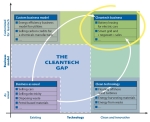
Health toilet in Japan - Source: ideaconnection.com
It is always interesting to see how pushing some trends to the limit create challenging scenarios. While most people will agree about the existence of a trend, few will care to walk through the unintended consequences. Here is a great example of how our mental models if unchallenged can leave some gigantic blind spots in our understanding of what the future may hold.
Pr. Sanjay Sarma from MIT recently gave a presentation to an audience of supply chain executives on the state-of-the-art of sensing. Sensors are now ubiquitous: in you car, your house, your cell phone, etc. There is a clear consensus that this is just the beginning. More complex sensors are becoming more affordable everyday. The computing power and infrastructure to handle the data is also getting exponentially cheaper. With your IPhone, you can already scan the bar code of the product you want to buy, and search on the Internet where to find it at the cheapest price. We are just a couple of years away from sensing appliances in our homes. Your fridge will sense when you will be out of milk or Diet Coke and will signal it to you. The sensing toilet is a reality in Japan. After analyzing your “body fluids,” the toilet makes recommendations for your diet and will give you information that you used to only get through a blood test i.e. sugar level, etc.
Everybody in the audience bought into a future where sensing was omnipresent. The supply chain executives could already experience in their businesses how sensing has become a pervasive innovation – from GPS tracking to RFID tags. However, when asked about the potential implications in such a future, they quickly concluded that dynamic routing would be the most important impact in their respective industries. Sure, being able to reroute your fleet to avoid congestion will allow saving a lot of money. But, is it really the most dramatic impact you can think of for this type of technology? Read the rest of this entry »
42.360539
-71.090074






